Shock, dismay, fear, and anger after the massacre of 10 people on Buye Avenue in Ngagara zone section 3, on 13th October. The people of this community talk about a police operation characterized by killings and extortion of innocent people. Translated by Diane Uwimana
3:20 p.m. Two grenade explosions were heard near the primary school in Ngagara Q3. Two men’s bodies were lying in a field of this school. “There are ppolicemen from API (support for the protection of institutions) in civilian clothes,” one witness said.
According to nearby residents, the two men were caught trying to spy on a group of young people meeting in the one of the classrooms of the school. “Before being killed, they were handcuffed. Two grenades were thrown at them. One of them died at the scene and the other dying was seriously injured.”
About twenty minutes later, three pick-up trucks filled with API officers, heavily armed with machine guns and rocket spears and Kalashnikovs, arrived on the scene and picked up the two policemen’s bodies. “We do not know who killed these policemen because our children played quietly on the ground,” said one resident.
Ten minutes later, sporadic gunfire began. Everyone went home. API agents crisscrossed the neighborhood around the primary school Q3; others want to break into households.
Summary executions
At a house owned by a resident named Dominique, the police launched a rocket to force the metal door and shoot the locks. Very damaged, the door did not yield. “We were hiding under beds. We believed that our time had come,” said one member of this family.
Before heading to the next household, they shot on the glass windows, causing damage in the living room by saying ” tuzobamara mwa mihimbiri mwe , nizirimunda ziveyo . Mwabanyegeje he! “(We will exterminate you all even those who are still in the wombs of their mothers. Where have you hidden? ) No one was injured or killed on the scene.
These same officers could not enter the house where there were three children and a housekeeper. Parents were away visiting friends’ downtown.
Arrived at the house of Christophe Nkezabahizi, a cameraman for the National Radio and Television of Burundi ( RTNB ) , police ordered all those who are in the house, and have nothing to be ashamed to go out, said a witness who attended the whole scene through the window of his house.
Christophe Nkezabahizi came out first. Arriving at his gate, he gave his identity. API officers do not leave him time to finish. He was shot in the head in front of his wife, his two children and his nephew. They were led off the property and the police ordered them to kneel in the street, their arms above their heads.
The ransom
Meanwhile, other police officers were operating in the next household. There, they find a pregnant woman and her groom. Two of them searched the house. The lady of the house gives them BIF 150 000. It is in leaving the officer found Nkezabahizi’s wife Alice Niyonzima, both children of Christophe Nkezabahizi ( a girl aged 17 and a boy age 20) and nephew ( Evariste Mbonihankuye , twenties ) . He asked his colleagues why they are still alive. He shot them each a bullet in the head.
API officials then headed in another household where they found an old woman and a certain Juvenal aged 16. “Without qualms, they shot him in the head while he was hiding in the veranda. The poor boy did not have time to enter in the house,” said the boy’s mother.
After the killing of Juvenal, API officials returned within the parcel and broke down the door of a Congolese student: “They were five and were very excited. They entered the house and began to search. They took 75,000 francs in my suitcase and my four mobile phones. They said shoot everything that moves.” The student says he showed his identity and the police left the place.
“It was killing and stealing”
These agents are then directed to another gate and attacked a public works agent named Céléstin. “They shot him in the right leg at the knee. He fell and was dragged along the ground into his house.” The police pursued and searched his room. They took 120,000 francs, a phone and a gold chain.
Meanwhile, other police officers forced the portal of the house of a shopkeeper named Damien. “We were hidden and a group of policemen came and they forced the gate. This was an operation to murder and pillage.” According to him, the police took 6 cottonseed oil cans, BIF 350,000 in cash and all recharge cards for phones, Bavaria beer, bread and cookies. They also grabbed a bag of sugar of 100 kg which theyleft behind.
Just in front of this shop, these agents stormed another household of a woman of about sixty years who was with her servant and another unknown displaced person. The woman was spared but the two young men were killed. She also gave all the money she had on her, a sum of BIF 100,000.
According to her, which is dramatic in all that happened was that nobody came to their rescue, “We were at the mercy of these API agents. What did we do to deserve such determination, such animosity,” she asked, in tears. This lasted more than an hour.
“The police act in self-defense …”
Around 700pm, 3 grenades exploded at the Ngagara zone headquarters. The police attacked, responding with gunfire. Three vehicles parked outside the offices of the area were damaged.
Meanwhile, several shootings and explosions made themselves heard around Bujumbura city and the nearby towns of Bujumbura Rural. The night of Tuesday to Wednesday will be a nightmare because of gunfire and explosions resume with a vengeance in the middle of the night.
The next day: Press conference at the headquarters of the police. Pierre Nkurikiye, spokesman of this institution, says nine people died in the crossfire between the police and “criminals”. Among the bodies, the police were able to identify two of these. He is careful not to take responsibility for the death of cameraman RTNB any of the protagonists but merely mention it as collateral damage. « The police investigation will determine who are the perpetrators of the journalist’s death.”
He refutes the theory that the disproportionate use of force is the result of hatred of some elements of the police against the Tutsi: “All operations are carried out by Hutu and Tutsi elements. » A policeman who survived the kidnapping reveals that the policeman killed was Tutsi.
The Police spokesman speaks up: “The police act only in self-defense and right to prosecute the perpetrators.” He showed the press, two grenades, an unexploded bomb, two magazines filled with ammunition, and a military outfit seized at the site of the operation. After long explanations, he concludes: “The police do not act under the influence of emotion. They show great restraint and flawless professionalism.”

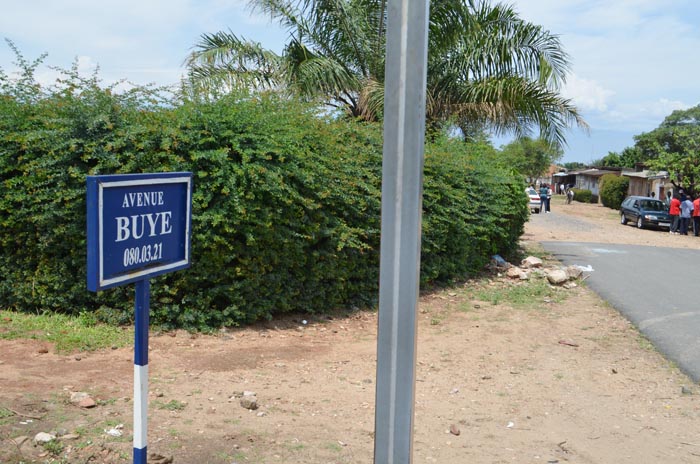
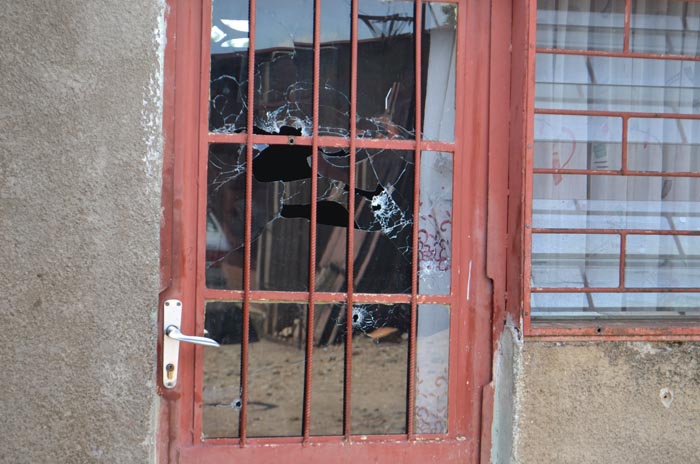
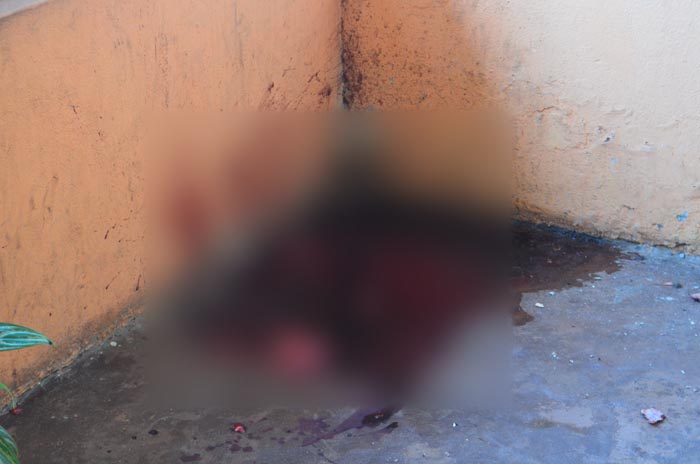
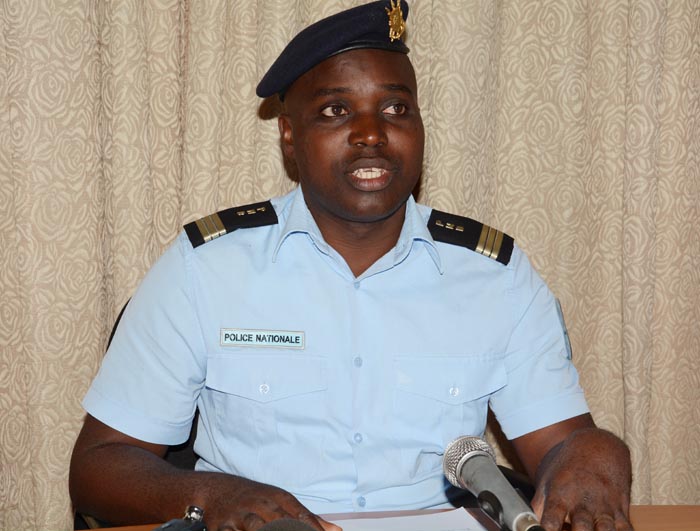
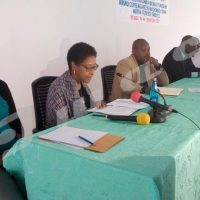
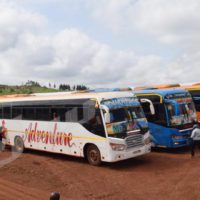
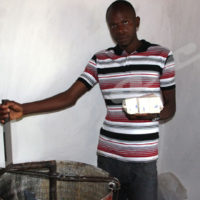















 IWACU Open Data
IWACU Open Data

